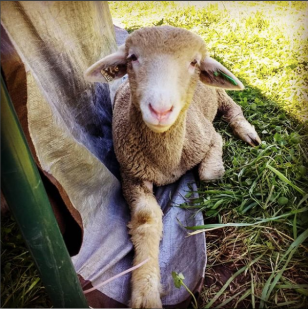UMASS’S FIRST CARBON FARMING INITIATIVE DEMONSTRATES HOW TO SUSTAINABLY GROW FOOD AND MITIGATE CLIMATE CHANGE
Repost from the UMass SFF Blog
By: Lisa DePiano and Nicole Burton
The UMass Carbon Farming Initiative is the first temperate climate research silvopasture plot at the University of Massachusetts. Carbon farming is the practice of sequestering carbon from the atmosphere into soil carbon stocks and above ground biomass. Silvopasture, a carbon farming practice is the intentional combination of trees and livestock for increased productivity and biosequestration.
The plot is a 1 acre silvopasture system at the Agriculture Learning Center (ALC) that integrates a diverse planting of complex hybrid chestnuts systematically arranged to ensure ease of management for rotational grazing sheep. Establishment of the initiative has been funded by the Sustainable Food and Farming Program (SFF) and a grant from the Sustainability Innovation and Engagement Fund (SEIF) and is managed by Stockbridge School of Agriculture Faculty Lisa DePiano and Nicole Burton and SFF students.
According to Project Drawdown, a broad coalition of scientists, policy makers, business leaders, and activists that have compiled a comprehensive plan for reversing climate change, silvopasture is the highest ranked agricultural solution to climate change. Silvopastoral systems contribute to climate change mitigation both through the direct drawdown of atmospheric carbon into soil and biomass and through the reduction in the greenhouse gas emissions emitted by industrial livestock systems. With the growing demand for meat and dairy products, and the limited amount of land available it is essential that we identify agricultural practices that are part of the solution rather than exacerbating the problem.
In order to get to down to 350 ppm of atmospheric CO2, the safe amount of concentration of carbon in the atmosphere, we need to have NET Zero carbon emissions and remove 300+ billion tons of carbon from the atmosphere.Research suggests that silvopasture systems are capable of storing as much as 100 tons of Carbon (367 tons of CO2) per acre while adding the yields of tree crops to the existing animal systems, and ecological benefits like reduced nutrient runoff, erosion, and animal stress from heat and wind. Traditional silvopasture systems, such as the dehesa in Spain and forest pastures in Scotland, have existed for centuries but more research and development is needed for cold climate sites in the United States.
Some goals and objectives for this project are:
- Establish a concrete example of carbon farming. This example will function as an outdoor classroom for SFF and related courses as well as a demonstration site for farmers and policy makers.
- Trial different varieties of complex hybrid chestnuts looking for traits like climate hardiness, nut size and yield, disease resistance, and precociousness
- Test market for products such as chestnuts, chestnut flour, nursery scion wood
- Track financial implications of these practices such as: cost of establishment, ongoing costs, revenue streams, and CO2 sequestration per acre
- Empower students as emerging leaders in the cutting edge fields of Permaculture, carbon farming and sustainable animal husbandry.
- Conduct research and development to support regional farmers in adopting carbon farming practices and strategies
- Catalog the carcass yields of the pastured livestock
- Monitor and test parasitic loads with livestock
- Track rotations of sheep
For more information on the Initiative contact Lisa DePiano at ldepiano@umass.edu or Nicole Burton at ngburton@umass.edu





